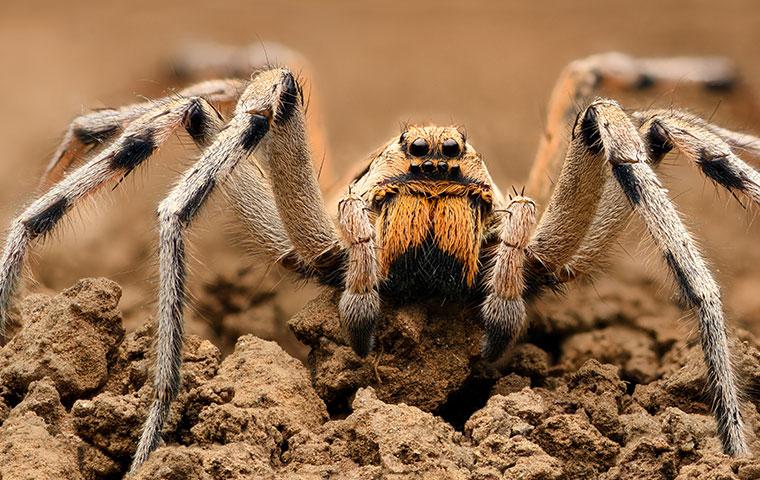
What Are Spiders?
All spiders have two body regions (cephalothorax and abdomen), eight legs, and fangs (chelicerae). Spiders do not have wings or antennae. Most, but not all spiders have eight eyes. Spiders are arachnids and are closely related to mites, ticks, and scorpions. They typically live and feed outside, but do commonly find their way into Raleigh homes, garages, sheds, barns, and other outbuildings.

Some of the common spider species found in North Carolina are daddy longlegs spiders, wolf spiders, cellar spiders, and black widow spiders.
Daddy Longlegs
Daddy longlegs are reddish-brown, or gray in color. They have small bodies and eight long and skinny legs. Daddy longlegs only have one body segment and therefore, are not a "true" spider.
Wolf spiders
Wolf spiders are large, fast-moving spiders. Instead of using a web to catch their prey, they chase and "hunt" their prey. Wolf spiders are dark brown in color, and they typically have two dark stripes on their back. Wolf spiders have great vision. They have stout bodies, long legs, and are covered in hair.
Cellar spiders
Cellar spiders are pale yellow to light brown or gray in color. They have small oval-shaped bodies and eight long, thin legs. These spiders are often confused with daddy longlegs, but are a "true" species of spider.
Black Widow Spiders
Black widow spiders have an orange-red "hourglass" mark on the underside of their abdomen. These spiders also have light red or white markings on their abdomen and backs. Their round bodies are shiny-black in color.
Are Spiders Dangerous?
Spiders are naturally reclusive, and only bite when they feel threatened. Most spiders found living across the United States are not dangerous and are considered nuisance pests. Daddy longlegs, wolf spiders, and cellar spiders are all examples of nuisance spiders. The venom of nuisance spiders is usually not strong enough to cause significant harm to people. There are dangerous spiders living in the United States, however, such as black widow spiders. Their venom affects the nervous system, and is strong enough to cause health problems that require medical attention. Care should always be taken around black widow spiders.
Why Do I Have A Spider Problem?
Spiders prefer to live outside, and are found on any property that provides the food, water, and secluded shelter sources they seek. Spiders can become a problem inside homes and other buildings after traveling inside while foraging for food. It is also not uncommon for spiders to move indoors if the weather outside becomes too hot, dry, or wet for them to live comfortably. Spiders have the potential to become more of an issue for homeowners in the winter after following their prey (insects) inside.
Where Will I Find Spiders?
To eliminate nuisance or dangerous spiders, partner with an experienced pest control professional. At Pest & Termite Consultants, we offer the modern services needed to solve your property’s spider problem. Our qualified professionals provide accurate identification, cost estimates, and perform effective spider treatments. To learn more about our spider control services and how we can protect your home from invasive pests, reach out to us!
How Can I Prevent Spiders In The Future?
To discourage spiders from choosing your home to live in, we suggest doing the following:
- Remove water sources.
- Seal openings found in the foundation and exterior walls of your home.
- Place a cap on your chimney.
- Repair holes in door and window screens.
- Place weather stripping around all windows and doors.
- Trim shrubs and bushes away from the exterior of your home.
- Place garden areas, wood piles, and compost piles a distance away from the exterior of your home.








